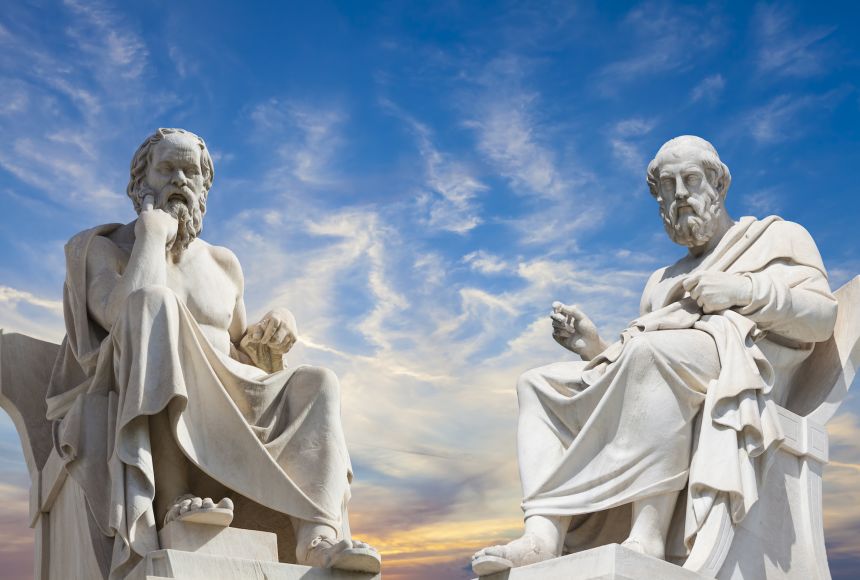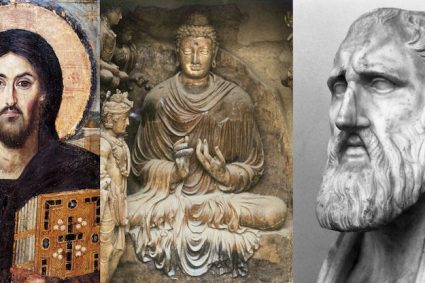

Ancient Greek philosophy, emerging in the 6th century BCE and flourishing through the classical period, laid the groundwork for Western philosophical thought. Brilliant minds like Thales, Pythagoras, Socrates, Plato, and Aristotle engaged in profound inquiries into metaphysics, ethics, epistemology, and politics, shaping the intellectual landscape for centuries to come.
Milestones of Thought:
- Thales of Miletus: Often considered the first philosopher, Thales sought to explain the natural world through rational principles rather than mythology. He proposed that water was the fundamental substance of all things.
- Pythagoras: Known for his contributions to mathematics, Pythagoras established a school that explored the relationships between numbers and the harmony of the cosmos. The Pythagorean theorem remains a cornerstone of geometry.
- Heraclitus: Embracing the idea of constant change, Heraclitus famously stated, “You cannot step into the same river twice.” He believed that fire was the primary substance, symbolizing the ever-flowing nature of reality.
Socratic Method and Ethics:
- Socrates: Renowned for the Socratic method—a form of cooperative argumentative dialogue—Socrates focused on moral and ethical questions. He believed in the pursuit of virtue and self-knowledge and famously declared, “An unexamined life is not worth living.”
- Plato: A student of Socrates, Plato founded the Academy in Athens. His philosophical dialogues, including “The Republic,” explored the nature of justice, the ideal state, and the theory of Forms, asserting that abstract concepts like beauty and justice exist in a realm of perfect Forms.
- Aristotle: A pupil of Plato, Aristotle contributed extensively to metaphysics, ethics, politics, and natural philosophy. His systematic approach to knowledge emphasized empirical observation, classification, and analysis. Aristotle’s works include “Nicomachean Ethics” and “Politics.”
Metaphysics and Epistemology:
- Parmenides and Zeno: Parmenides argued for the unity and immutability of reality, while Zeno formulated paradoxes to challenge the concept of motion. Their ideas sparked debates about the nature of being and the reliability of human senses.
- Empedocles: Proposing the theory of the four elements (earth, water, air, and fire), Empedocles contributed to early notions of material substance and the principle of love and strife governing their interaction.
Legacy and Impact:
- Academic Traditions: The Academy, founded by Plato, and the Lyceum, established by Aristotle, became influential centers of learning. These institutions laid the foundation for systematic inquiry and the transmission of knowledge.
- Rational Inquiry: Greek philosophy’s emphasis on reason and logical analysis laid the groundwork for scientific thinking and the development of the scientific method.
- Political Philosophy: The works of Plato and Aristotle on governance, justice, and the role of the citizen influenced political thought and governance systems throughout history.
Challenges and Critiques:
- Sophists: Contrary to the idealism of Socrates, Plato, and Aristotle, the Sophists emphasized practical skills and rhetoric, questioning the existence of universal truths.
- Skepticism: Philosophers like Pyrrho challenged the certainty of knowledge, advocating skepticism and the suspension of judgment.
Conclusion: Enduring Inquiries into the Human Experience:
Ancient Greek philosophy represents a pivotal chapter in intellectual history, marked by a quest for understanding the nature of existence, ethics, and governance. The enduring legacy of Greek philosophy continues to shape contemporary thought, providing a timeless foundation for the exploration of the human experience and the pursuit of wisdom.







